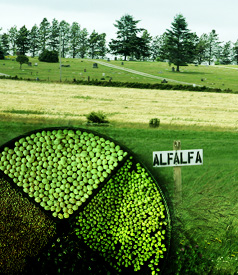Monsanto, Opponents Both Claim Victory in Historic Genetically Modified Crop Case
Tuesday 22 June 2010
by: Mike Ludwig, t r u t h o u t | Report

(Image: Jared Rodriguez / t r u t h o u t; Adapted: Manuel W., swanksalot)
In a landmark case on genetically modified (GM) crops, The US Supreme Court ruled 7-1 on Monday in favor of agribusiness giant Monsanto and overturned a lower court's decision to ban the company's GM alfalfa until the US Department of Agriculture (USDA) fully analyzed the crop's potential dangers.
Monsanto applauded the decision and assured farmers that the alfalfa seeds, which are engineered to be resistant to Monsanto's glyphosate-based Roundup herbicide, could be available for planting as early as this fall. Monsanto's opponents, however, claim they won the day because, under the high court's ruling, the GM alfalfa remains illegal until the USDA officially deregulates the crop, a decision that can be challenged by the public.
A coalition of organic farmers and environmentalists sued the USDA in 2006 over its approval of the Monsanto's GM alfalfa. The groups cited concerns that the alfalfa could cross-pollinate and infect organic alfalfa farms, and the overuse of Roundup herbicide could contaminate soil and groundwater while promoting the growth of Roundup-resistant "super weeds."
Monsanto and its biotech allies jumped in to support the USDA, but, in 2007, a US District Court in San Francisco ruled the USDA failed to address these concerns and placed a nationwide ban on the alfalfa seeds until the department completed a full environmental impact analysis.
Supreme Court Justice Stephen Breyer did not participate in Monsanto v. Geertson Seed Farms because his brother, US District Judge Charles Breyer, made the initial ruling to ban the alfalfa.
An appeals court upheld the ban, so Monsanto took the case to the top. The company announced in March the completion of a nearly $200 million expansion of a chemical plant in Louisiana that manufactures the Roundup Ready herbicide.
The Supreme Court's ruling overturned the lower court's injunction because it was legal "overkill," according to the Center for Food Safety (CFS), Monsanto's lead opponent in the case.
"The bottom line is that the Supreme Court set aside the injunction because the vacating of the commercialization decision already gave us all the relief we needed, by forbidding RRA [Roundup Ready Alfalfa] planting until a new decision is made by the agency," CFS senior attorney George Kimbrell said in a release. "And at such time, farmers and consumers still have the right to challenge the adequacy of that process."
"The Court's decision affirmed that the threat of genetic contamination of natural plants posed by biotech crops is an issue of significant environmental concern now and in the future," Kimbrell said.
The case has been remanded to a lower court with the instruction to allow the USDA's Animal and Plant Health Inspection Service (APHIS) to make an interim decision and decide if some GM alfalfa can be planted while the USDA completes a full environmental impact statement.
"This is exceptionally good news received in time for the next planting season. Farmers have been waiting to hear this for quite some time," said Steve Welker, Monsanto's alfalfa business lead. "We have Roundup Ready alfalfa seed ready to deliver and await USDA guidance on its release."
The USDA, however, indicated during the case that the full deregulation is about a year away and interim deregulation will not be pursued, according to the CFS.
Organic food is the fastest growing sector of the food industry, and any move to deregulate GM alfalfa will be challenged, according to the CFS. More than 60 businesses, organizations and individuals supported the CFS case against the Monsanto's alfalfa, including the attorneys general of California, Oregon and Massachusetts, who filed a brief emphasizing "the States" interest in protecting its environment and natural resources
The majority opinion, written by Justice Samuel Alito, upheld the public's right to challenge future deregulation: "In sum ... the vacatur of APHIS's deregulation decision means that virtually no RRA (Roundup Ready Alfalfa) can be grown or sold until such time as a new deregulation decision is in place, and we also know that any party aggrieved by a hypothetical future deregulation decision will have ample opportunity to challenge it, and to seek appropriate preliminary relief, if and when such a decision is made."
In a brief filed in the Supreme Court supporting CFS, the Union of Concerned Scientists argued that genetically modified crops and their herbicides pose "substantial risks of harm to the human environment" because of their potential to spread unwanted genes to surrounding fields and promote herbicide resistant weeds. The brief states that both events are "likely" and the harm would be "irreversible."
Past reviews by the Food and Drug Administration and the Environmental Protection Agency found Roundup Ready alfalfa to be safe, according to Monsanto. The company claims Roundup Ready alfalfa was planted by 5,500 growers before the 2007 ban.
Etiquetas: Alfalfa, Monsanto, Supreme Court

0 Comentarios:
Publicar un comentario
Suscribirse a Comentarios de la entrada [Atom]
<< Página Principal